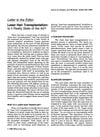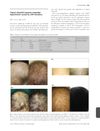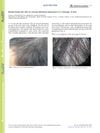3 citations,
July 2023 in “International journal of molecular sciences” Stress may contribute to hair loss in alopecia areata by affecting immune responses and cell death in hair follicles.
[object Object] 50 citations,
May 2021 in “Frontiers in immunology” Certain immune cells contribute to skin autoimmune diseases, and some treatments can reverse hair loss in these conditions.
August 2023 in “Health Sciences and Pharmacy Journal” Herbal therapies may effectively treat alopecia with fewer side effects than synthetic drugs.
 15 citations,
January 1996 in “Lasers in Surgery and Medicine”
15 citations,
January 1996 in “Lasers in Surgery and Medicine” Lasers in hair transplantation may have potential but require caution due to possible damage and reduced graft survival.

Skin changes can help predict thyroid diseases.
30 citations,
August 2008 in “The journal of investigative dermatology/Journal of investigative dermatology” TGase 3 helps build hair structure by forming strong bonds between proteins.
 83 citations,
June 2018 in “Frontiers in immunology”
83 citations,
June 2018 in “Frontiers in immunology” Certain types of T cells are essential for healthy skin and play a role in skin diseases, but more research is needed to improve treatments.
 April 2023 in “The journal of investigative dermatology/Journal of investigative dermatology”
April 2023 in “The journal of investigative dermatology/Journal of investigative dermatology” People with alopecia areata have fewer IL-10 producing immune cells, which might contribute to the condition.

An 11-year-old female Pinscher with Pemphigus Foliaceus was successfully diagnosed and treated.
[object Object]  January 2017 in “IMC Journal of Medical Science”
January 2017 in “IMC Journal of Medical Science” A rare endocrine disorder, APS 1, was diagnosed in a 26-year-old man in Bangladesh.
 September 2014 in “Hair transplant forum international”
September 2014 in “Hair transplant forum international” Automated devices are beneficial for hair restoration.
 20 citations,
July 2013 in “European Journal of Oral Sciences”
20 citations,
July 2013 in “European Journal of Oral Sciences” A new PAX9 gene mutation causes missing teeth and hair problems, but not skin or nail issues.
 5 citations,
January 2005 in “Journal of Enzyme Inhibition and Medicinal Chemistry”
5 citations,
January 2005 in “Journal of Enzyme Inhibition and Medicinal Chemistry” New steroids were effective in blocking male hormone receptors in hamster prostates.
3 citations,
October 2020 in “The journal of investigative dermatology. Symposium proceedings/The Journal of investigative dermatology symposium proceedings” Alopecia areata is a hair loss disease caused by complex immune reactions, and new targeted treatments show promise.
 January 2018 in “Journal of cosmetology & trichology”
January 2018 in “Journal of cosmetology & trichology” The Automatic Biofibre® Hair Implant is a fast and effective hair restoration method that provides immediate cosmetic benefits and good results in over 90% of cases, but requires proper care to avoid complications.
 7 citations,
March 2015 in “British Journal of Dermatology”
7 citations,
March 2015 in “British Journal of Dermatology” Applying minoxidil can help improve hair growth in people with hair loss caused by LIPH gene mutations.
 3 citations,
July 2015 in “Australasian Journal of Dermatology”
3 citations,
July 2015 in “Australasian Journal of Dermatology” A man developed an allergic skin reaction to a rosacea treatment and improved after stopping the medication and receiving allergy-specific care.
 October 2022 in “Benha Journal of Applied Sciences”
October 2022 in “Benha Journal of Applied Sciences” Human Beta Defensin 1 levels do not predict the risk or severity of Alopecia Areata.
 1 citations,
January 2018 in “Acta dermato-venereologica”
1 citations,
January 2018 in “Acta dermato-venereologica” A teenager's hair with alternating white and dark bands, known as Pili annulati, is a genetic condition that is usually harmless and often considered attractive.
 1 citations,
December 2016 in “Vìsnik farmacìï”
1 citations,
December 2016 in “Vìsnik farmacìï” The best gel to treat a type of hair loss has 1% sodium alginate, 1% carbopol, 5% glycerin, 0.2% potassium sorbate, and water.
 12 citations,
June 2016 in “Clinical and Molecular Hepatology”
12 citations,
June 2016 in “Clinical and Molecular Hepatology” Mycophenolate mofetil can effectively treat autoimmune hepatitis when standard drugs fail.
 May 2023 in “Frontiers in Immunology”
May 2023 in “Frontiers in Immunology” Treg cell-based therapies might help treat hair loss from alopecia areata, but more research is needed to confirm safety and effectiveness.
 January 2016 in “Georg Thieme Verlag eBooks”
January 2016 in “Georg Thieme Verlag eBooks” More East Asians are accepting and getting facial plastic surgery, with a focus on natural-looking results and using both surgical and nonsurgical methods.
December 2008 in “Al-Mağallaẗ al-ʻirāqiyyaẗ li-l-ṣaydalaẗ” Antioxidants improved hair growth in alopecia areata patients regardless of disease duration.
5 citations,
May 2018 in “Veterinary dermatology” Gluconolactone products can significantly reduce skin scaling in golden retrievers with ARCI.
9 citations,
June 2017 in “The journal of allergy and clinical immunology/Journal of allergy and clinical immunology/The journal of allergy and clinical immunology” Local inflammation worsens autoimmune skin conditions by increasing antibody buildup.
8 citations,
July 2015 in “Molecular cytogenetics” A complex X chromosome rearrangement can increase the risk of multiple autoimmune diseases.
ILC1-like cells may contribute to hair loss in alopecia areata.
 December 2024 in “Dermatological Reviews”
December 2024 in “Dermatological Reviews” New treatments for Alopecia Areata, like JAK inhibitors, are effective, and future research is exploring advanced therapies.
January 2019 in “Archives of dermatology and skin care” Biomimetic peptides were found to promote hair growth and prolong the growth phase in human hair follicles.


















